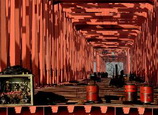
"It is not that bad if children indeed really get a two-yuan meal. After all, some people want to gain a fortune," Deng said, implying that the actual situation could be worse, People's Daily reported.
Deng said he had suggested building a school canteen, but local officials refused. "It is so strange," he said. "We would like to use public donations to cover all of the expenses, but this was rejected."
Wu Yuangui, newly-appointed director of the Fenghuang Education Bureau, announced that the headmaster, two deputy heads and two county education officials had been fired and admitted that there had been "management loopholes."
But he dismissed allegations of corruption.
A school volunteer said they had received donations from the public of up to 20,000 yuan in the days after the news broke and there were plans to recruit a chef to cook for the children for the rest of the semester.
It is estimated that more than half the schools qualifying for the free lunch program employ cooks while 35 percent give the job to outside caterers and 12 percent distribute the allowances to parents.
In June, China published regulations regarding the implementation of the program, pledging safe and nutritious lunches, following public concern after several food poisoning cases, Xinhua news agency reported.
In Jiangsu Province, about 40 middle school students developed food poisoning symptoms after eating a free lunch at their school's canteen in April.
Yunnan Province has also reported four food poisoning incidents in schools since March.















 Traffic accident injures 40 people in HK
Traffic accident injures 40 people in HK


![]()
